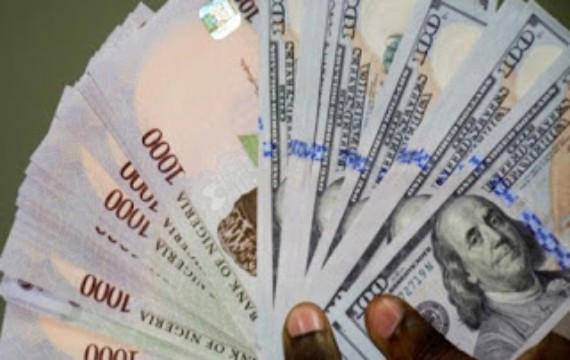News
Naira hits new all time low of N996/$1 at official NAFEM

The naira fell to a new low on Thursday, closing at N996.75 per dollar in the official market and N1090 per dollar in the parallel market.
The naira’s decline has come as a surprise to many analysts, who had expected the Central Bank of Nigeria’s (CBN) recent move to clear some of its FX backlog to boost confidence in the currency.
The domestic currency depreciated 12.24% to close at N996.75 to a dollar at the close of business on Thursday, data from the NAFEM where forex is officially traded, showed.
- This represents an N122.04 loss or a 12.24% decline in the local currency compared to the N874.71 it closed on Wednesday and a new all-time low per the Nairametrics tracker. The last all-time low was N993.8 recorded on October 30th.
- The intraday high recorded was N1100/$1, while the intraday low was N744.00/$1, representing a wide spread of N356/$1.
- According to data obtained from the official NAFEM window, forex turnover at the close of the trading was $228.54 million, representing a 101.32% increase compared to the previous day.
- Similarly, the naira weakened at the parallel forex market where forex is sold unofficially, the exchange rate depreciated by 5.5%, quoted at N1090/$1, while peer-to-peer traders quoted around N1110.10/$1.
Nairametrics’ analysis suggests that the official and parallel market exchange rates are nearing parity. The gap between the official rate and the black market rate has narrowed to approximately N100, which is close to a 10% premium, a margin that is generally considered acceptable.
What the expert is saying: Amid the rising free fall of the Naira both at the official Nigerian Foreign Exchange Market (NAFEM) and the unofficial market, financial experts had called on the Central Bank of Nigeria (CBN), to de-dollarise the economy by declaring any local transactions in US dollars illegal.
Speaking on strategies that can be used for the naira to regain strength, the founder and chief consultant of B. Adedipe Associates Limited (BAA Consult), Dr. Biodun Adedipe, said the CBN should stop government agencies from charging local operators and entities in US dollars.
According to him, the sale of crude oil to local refineries should also be made in Naira rather than in US dollars.
- Adedipe said: “CBN should deal transparently with participating banks at the I&E Window. De-dollarise the economy by declaring as illegal any local transactions in US dollars (sale of assets, rent/leases, and other services, including school fees and medical bills) and ensure that government agencies stop charging local operators and entities in US dollars (quite common in the maritime sector).
- “Other suggestions include the need to ensure that the sale of crude oil to local refineries should be made in Naira rather than dollar. “
- “President Bola Tinubu, should have a direct engagement with bank CEOs to generate ideas and use moral suasion to enlist their support for the market reforms. Face the reality that unified exchange rates (not any different than floating the Naira) is a poor policy choice for a structurally defective and weak economy like ours,” he added.
Nairametrics earlier reported that the Association of Bureau de Change Operators of Nigeria had warned those speculating against the naira to be wary.
The President of ABCON, Aminu Gwadabe gave the warning and noted that the Central Bank of Nigeria was set to inflict pain on currency speculators.
- “What is happening in the market and the continuous naira rebounds are the manifestations of the CBN double-edged sword measures of dollar liquidity injection and naira mopping through the instrumentality of interest rates hikes.
- “It is a good development as it is the greatest risk to speculate, hoard, and substitute naira for other currencies,” Gwadabe declared.


 Top Stories4 hours ago
Top Stories4 hours agoBreaking: Ibadan Stampede: Court Orders Remand Of Ooni’s Ex-Wife, School Principal

 Top Stories9 hours ago
Top Stories9 hours agoI’m not prepared to downsize my cabinet — Tinubu

 Entertainment6 hours ago
Entertainment6 hours agoJay-Z has no ‘plans to show loyalty to longtime friend Diddy’ as he battles r@pe allegation

 Entertainment6 hours ago
Entertainment6 hours agoRegina Daniels reveals the best way to predict one’s future as she shares more photos from her vacation

 Sports6 hours ago
Sports6 hours agoGOAT: Who said Messi is better than me – Cristiano Ronaldo

 News9 hours ago
News9 hours agoBREAKING: “I Have No Regrets” – Tinubu Defends Fuel Subsidy Removal Amid Economic Hardship [VIDEO]

 Entertainment6 hours ago
Entertainment6 hours agoSelena Gomez flashes gorgeous $1M engagement ring

 Entertainment6 hours ago
Entertainment6 hours agoToyin Abraham clears the air on her appreciation post







